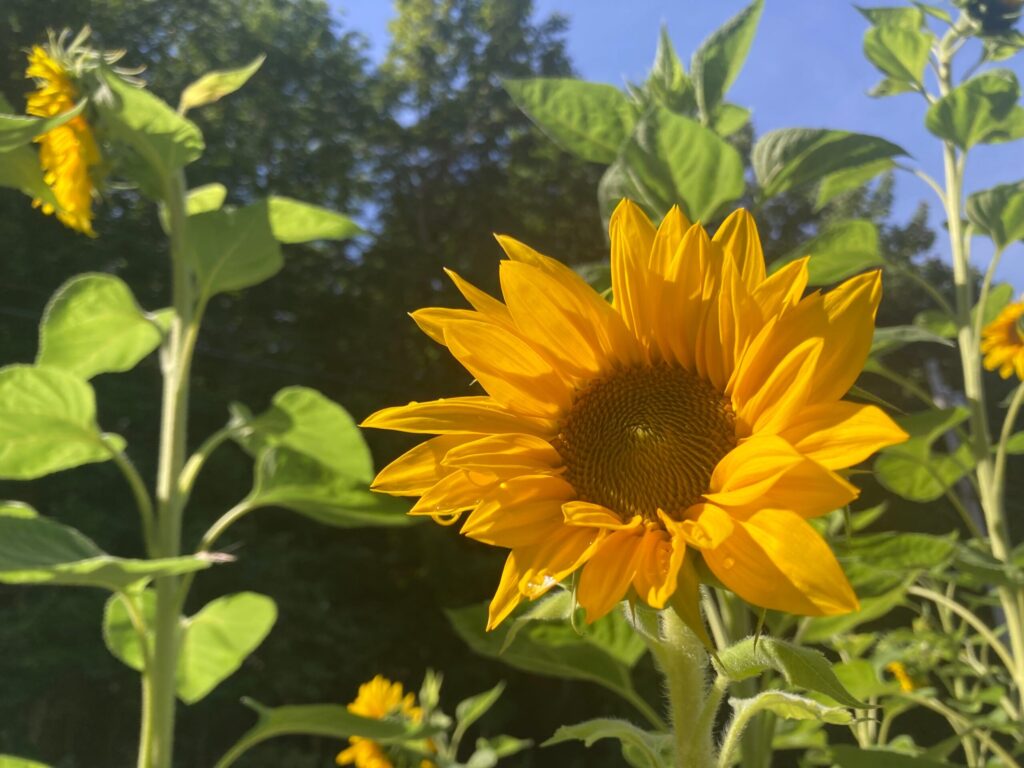Once upon a time European settlers came to the forests and harbors we inhabit, saw potential for trade and commerce, and settled. Others joined them, building homes, businesses, roadways, and harbor infrastructure. Plowing fields. Growing food.
And for over 250 years the Midcoast has continued to attract settlers. Mostly we’ve had years of stable climate, where our water and food systems have provided what we humans have needed to live, perhaps even thrive.
While we’ve been building our industrial, coastal culture we’ve also been using planetary resources, altering natural habitats with human settlements, and burning fuels that have warmed our atmosphere.
As we’ve built and invested, we’ve noticed changes. Our everyday experience of living here has changed, with more extreme storms, hotter summers, warmer and shorter winters. The timing of seasons is off; the numbers and variety of insects have changed; we have fewer sea stars and more green crabs in our tide pools. As the EPA wrote in 2016:
Maine’s climate is changing. The state has warmed about three degrees (F) since the year 1900. Throughout the northeastern United States, spring is arriving earlier and bringing more precipitation, heavy rainstorms are more frequent, and summers are hotter and drier. Sea level is rising, and severe storms increasingly cause floods that damage property and infrastructure. In the coming decades, changing the climate is likely to increase flooding; harm ecosystems; disrupt fishing, agriculture, and winter recreation; and increase some risks to human health. (EPA Snapshot, August 2016)
Climate change in other parts of the country has also created stresses here. Many of our new friends and neighbors in the Midcoast are transplanted from Western states where the threat of fire was too great. Other Midcoasters moved here because Maine’s climate is cooler and more hospitable than their old homes— in the US South or Southwest.
Now our systems—infrastructure and social—are straining. Our water and wastewater systems are maxed out, and we citizens are literally paying the price. Our housing system is stressed. Our buildings, built for a different climate, are now often too hot in the summer.
Ours is a time of uncertainty—we don’t know how much warming we’ll face because we can’t stop burning fossil fuels. Physics tells us that as long as we keep adding CO2 to the atmosphere, the amount our planet will warm keeps increasing. Each degree of warming makes the climate more unstable.
Despite our hundreds of years of coastal stability, we now can’t count on a predictable future.
Climate Intuition, Climate Literacy, and Risk Management
It’s our contention that we all know—can feel in our bones, so to speak—that the climate has changed, is changing. It’s not just the loses we’ve accounted for above—our nervous systems sense that things are different.
This intuition creates a discomfort. But once we tap into this sense, this wisdom of climate and how it affects us, it provides an opening to action. It’s akin to hearing a sound in the night—vague, unnerving—yet once you figure out what it is—for instance, it’s the screen door banging—you can get up and fix it.
There’s not a corner of our lives that climate change leaves untouched. It impacts our physical health—think of air quality—our mental health and that of our children (60% of today’s youth respond that they have climate anxiety)—our fiscal health. Think of flooding in Texas, or hurricane damage in North Carolina, or the cost of repairing our own harbor, roads, and drainage systems.
Once we hone our climate intuition, paying attention to the subtle changes—summers that spill into Septembers, Decembers with rains that feel more like November—and build our climate literacy so that we understand the science, we can appropriately analyze the risks, formulating plans to help us avoid the worst outcomes. And we’ll feel better because we’re addressing our discomfort.
Why then, isn’t climate change central to the planning and approach we take to our lives? Why aren’t communities gathering to talk about living in our climate-changed world?
This is not a science or a technical problem—we have the fixes that can reverse our current global warming trends.
This is a question of willingness to name and address the problem.
And this is not a personal issue. This is a political issue, where policies and appropriate governance are needed.
Our thriving future in the Midcoast depends on our ability to take into account how climate is changing. Acting now, in our municipal budgets, in our home and school budgets, our school and church curriculums, to acknowledge this reality, recognizing the threats of instability, will allow us to be prepared.
To start, here are some suggestions:
- convene town-wide meetings and working sessions to talk about municipal spending priorities in this time of climate instability—making this kind of civic engagement regular (twice a year), productive, and guided by action plans;
- convene business roundtables to brainstorm climate challenges and solutions;
- help our schools and the children they educate to acknowledge climate anxiety and build support networks for local action children can be involved in. Two resources to check out are Subject to Climate here and Maine Climate Education here;
- get each town department and committee to address the impact of climate change on their work plans, and publish those findings, with regular updates;
- ask each town to invest in climate resilience funds to protect taxpayers from huge, unforeseen expenses caused by unexpected climate emergencies;
- ask our towns to create citizen committees to implement Harbor Resilience plans and other factors affecting the future economic viability of our area;
- set up funds for those struggling with climate-induced financial challenges, including rising costs for home heating/cooling; flood and fire protection; air quality issues;
- convene town-wide and smaller neighborhood sessions on emergency planning, involving creation of household emergency kits and neighborhood groups equipped with warning and messaging systems;
- hold regular forums with local nonprofits, municipal committees, churches and service organizations so citizens can engage in creative problem solving, including ways to approach housing scarcity, food insecurity, and green energy and transportation systems.
Depending on the status quo and ways of the past are not the way forward. Too much town planning and governance is based on past performance for solutions. For instance, if we’re considering the future of our town-owned ski area, we can’t assume we’ll have winter temperatures that drop below freezing (see map below). Our probable future is much warmer.
Resilient Reading Group
We’re convening a nine-session reading and conversation circle (Tuesday afternoons 4-5 pm at CPL, see more below) designed to help with both climate literacy and future planning. The first book for discussion will be climate scientist Kate Marvel’s Human Nature: Nine Ways To Feel About Our Changing Planet. Marvel, a NASA scientist, offers a humorous, insightful, and up-to-date analysis of where climate models say we’re heading—and the models’ limitations. The second offering will be Brian McLaren’s Life After Doom: Wisdom and Courage for a World Falling Apart. Far from a gloomy assessment, McLaren, who was both a pastor and professor of English, provides a handbook for living and thriving, even in uncertain and unstable times. We hope you’ll join us. See more below in the calendar.
Upcoming Climate-Change-Related Events
September 14, Sunday, 9:00 am to 1:00 pm, Camden Public Library Amphitheater. Wild Ones Midcoast Maine’s Native Plants Sale. There will be shopping from local native plant nurseries; educational booths with various organizations; children’s activities; conversations with native plant growers, experts, gardeners, and landscapers; speakers; music; and more! A great opportunity to learn more about native plants and incorporate them into your own garden and yard. See more here. RAIN DATE is Sunday, September 28.
September 16, Tuesday, 6:30 pm, Belfast Public Library, Waldo County Climate Action Coalition, What’s Going on with Solar Policy? Emily Rochford, community engagement manager for Maine Community Solar, and John Luft, Residential Sales Manager, Revision Energy, will talk about what the current energy polices mean for solar options going forward. For more information or to register for the zoom option visit here.
September 18, Wednesday, 5:00 pm to 8:00 pm Green Happy Hour with Midcoast Habitat for Humanity at the ReStore! Come grab a beverage with yours friends and colleagues in the beautiful ReStore, surrounded by salvaged and donated materials for your next building or renovation project. We’ll learn more about how Habitat works to expand affordable housing in our region, and what volunteer opportunities look like.
September 20 to October 4, WindowDressers Local Build for Camden/Rockland. Sign up here. Camden Legion Hall on Pearl Street.
September 23, Tuesday, 4:00 to 5:00 pm, Camden Public Library, CamdenCAN’s Resilient Reading Group. Facilitated conversation circle exploring current climate science and all its implications. Come meet others wanting to improve their climate literacy and explore ways to think about living in a climate-changed world. First book will be Kate Marvel’s Human Nature: Nine Ways to Feel About Our Changing Planet. Second book will be Life After Doom: Wisdom and Courage for a World Falling Apart/Brian D. McLaren. Dates will be 9/23, 10/7, 10/28, 11/11, 11/25, 12/9, 12/23, 1/13/26, 1/27/26. May include a zoom component if needed.
September 27, Saturday, 7:00 pm, Pascal Hall, Rockport, Lisa Redfern and the Good Trouble Project present a Benefit Concert for CamdenCAN. Save the date—more information to follow.
Saturday, October 4, Belfast: Climate Resilience Fair. Details here. EV Car demonstrations.
Concluding Thoughts
Climate instability leads to civic instability. And fear creeps in. Our challenge is to understand that the instability we’ve created is not a call to retreat. It’s a call to connect.
Improving our connections to one another to protect and improve life-sustaining planetary systems—the air, the water, the soil—is our way out of this instability.
Prioritizing community action that recognizes the changed climate and openly assesses the risks, and making future plans with our changed climate in mind, will allow the Midcoast to thrive 50 years from now.
We know the future won’t be like the past. We can’t assume that the plants that grew here thirty years ago will thrive in the next 50 years. We can’t assume we’ll have the same rainfall. We can’t assume we’ll have snow in the winter. We can’t assume that our homes and schools, built for cooler summer climates, will be hospitable in the coming Midcoast summers. We now know better.
We’re in this together. We’re bound and connected to this place we love on the coast of Maine. What will it take for us to plan and do better?
What kind of future do you want for the Midcoast?


